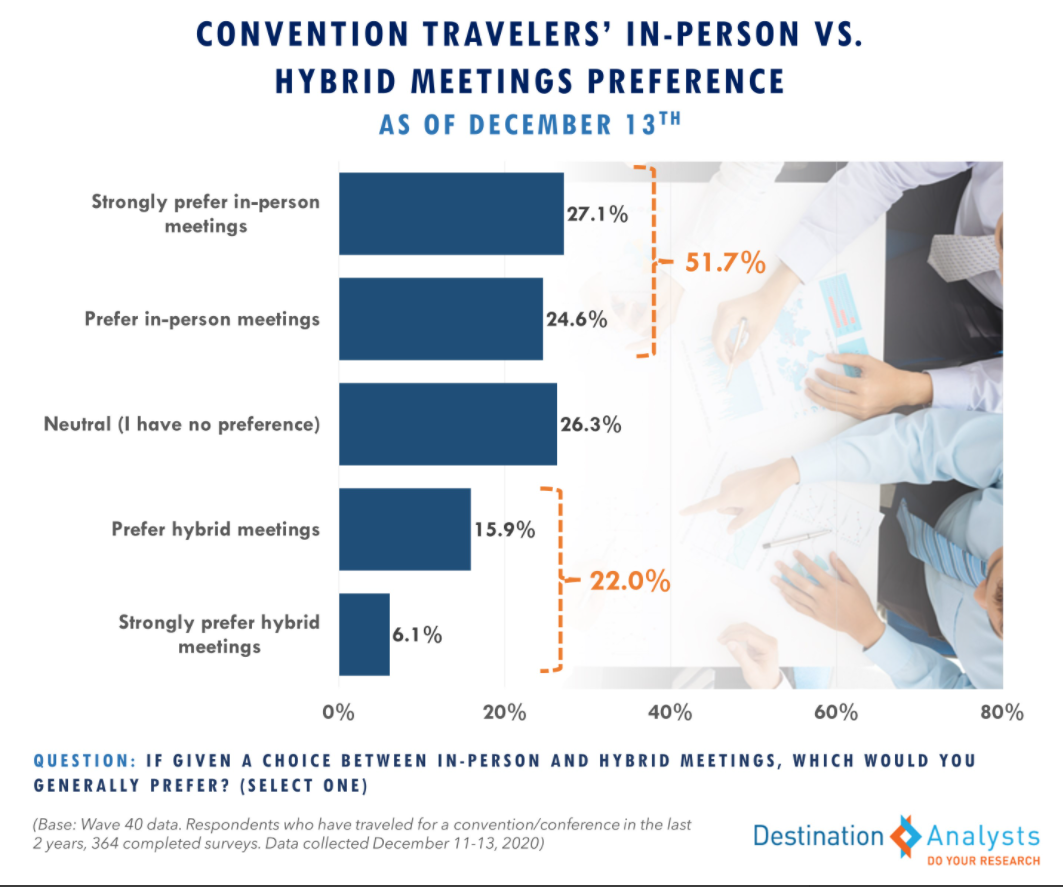Disclosure: The following research was posted on the Destinations Analysts website on 12/14/2020. Destination Analysts is a travel and tourism market research firm based in San Francisco, California. The Virginia Beach CVB is reposting for the convenience of our travel and tourism industry stakeholders and was not involved in the research in any manner.
IMPORTANT: These findings are brought to you from our independent research, which is not sponsored, conducted or influenced by any advertising or marketing agency. Every week since March 15th, Destination Analysts has surveyed 1,200+ American travelers about their thoughts, feelings, perceptions and behaviors surrounding travel in the wake of the coronavirus pandemic, and explored a variety of topics. The findings presented below represent data collected December 11th-13th.
Americans’ anxiety about the coronavirus came on strong again this week, hammering travel sentiment for the near-term. However, news of imminent vaccines are once again having a profound impact on Americans’ outlook for 2021.
Key Findings to Know:
- After dipping last week, Americans’ anxiety about the coronavirus came on strong again this week—both from a personal health and financial standpoint.
- These anxieties are hammering sentiment about travel right now. Rather than skewing towards readiness, Americans’ travel mindset is now evenly split between readiness and hesitation. Travel guilt, loss of interest in traveling for the time being, and agreement travel should be limited to essential needs only have all increased, while likelihood to travel over the next three months has decreased. Nearing two-thirds of Americans say the current pandemic situation makes them less likely to travel over the next three months. Such sentiments have led to inevitable behaviors–48.4% report they cancelled or postponed a trip specifically because of this current surge.
- Positive vaccine news is appearing to have a profound effect. 58.9% of Americans are back to feeling that the vaccine developments make them more optimistic about life returning to normal in the next six months, while 51.0% say the vaccines makes them more optimistic they can travel safely by then.
- The pandemic has, unsurprisingly, most weakened Americans’ sense of physical safety, as well as, sadly, their excitement about the future. However, an important percentage of Americans feels the pandemic has strengthened their feeling of being loved by others, and made them feel proud of themselves.
- Americans continue to exhibit receptivity to travel marketing for future trips. 50.1% continued to show higher degrees of excitement about taking a getaway soon, and 45.7% continue to have higher levels of openness to travel inspiration. The percent of Americans who recalls seeing a travel advertisement recently has risen steadily since May.
- Looking at the preferred channels for travel inspiration among those Americans most ready to travel, Facebook and Instagram, search engines and email campaigns is where these travelers will be most receptive.
- The percent of American travelers who have at least tentative plans to attend a convention or conference in the next year has risen to 23.5% from 15.7% two months ago. Comfort attending these events starts to grow in June 2021 and continues throughout the subsequent months.
- In our many recent interviews of meeting planners, it looks like hybrid events will be a norm in 2021. Fortunately, among those who have traveled for conventions in the last two years, 51.7% say they prefer in-person events. Yet, greater than one in five of these travelers (22.0%) say they prefer hybrid meetings. However, the destination in which a meeting is held could still sway a preference for in-person.
After dipping last week, Americans’ anxiety about the coronavirus came on strong again this week. The percent of Americans with high degrees of concern about personally contracting the virus jumped up to 73.3% from 66.7%, and the intensity of the concern to 6.9 on an 11-point scale, up from 6.5 last week. In similar fashion, those highly concerned about their friends and family contracting the virus rose to 77.8%, and the average level of concern grew to 7.4 from 7.1. This is the first time during this current surge that these anxieties have reached levels hit during the spring and summer virus surges. With a relief bill still not yet passed in Congress, financial worries also grew, with concern about the virus’ impact on personal finances now at 6.0 and concerns for the national economy at 7.7. While down somewhat from last week, still 60.7% of Americans feels the severity of the coronavirus situation in the U.S. will worsen in the next month.
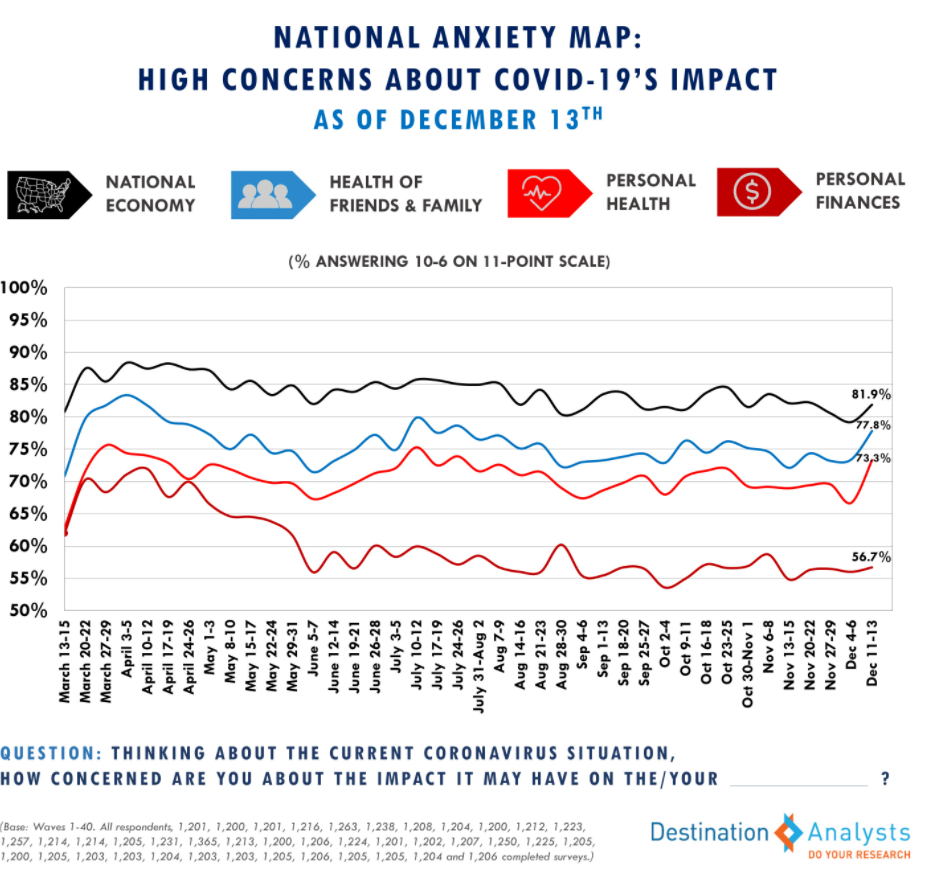
These anxieties are hammering sentiment about travel right now. Rather than skewing towards readiness, Americans’ travel mindset is now evenly split between readiness and hesitation—the last time this occurred was more than three months ago. This week, 54.6% of Americans said they would feel guilty traveling right now and loss of interest in traveling for the time being returned to 49.5% after falling to 43.1% last week. Over 58% feel travel should be limited to essential needs only and 54.8% agree they don’t want travelers coming to their own communities right now. Nearing two-thirds of Americans say the current pandemic situation makes them less likely to travel over the next three months. Such sentiments have led to inevitable behaviors– 48.4% report they cancelled or postponed a trip specifically because of this current surge.
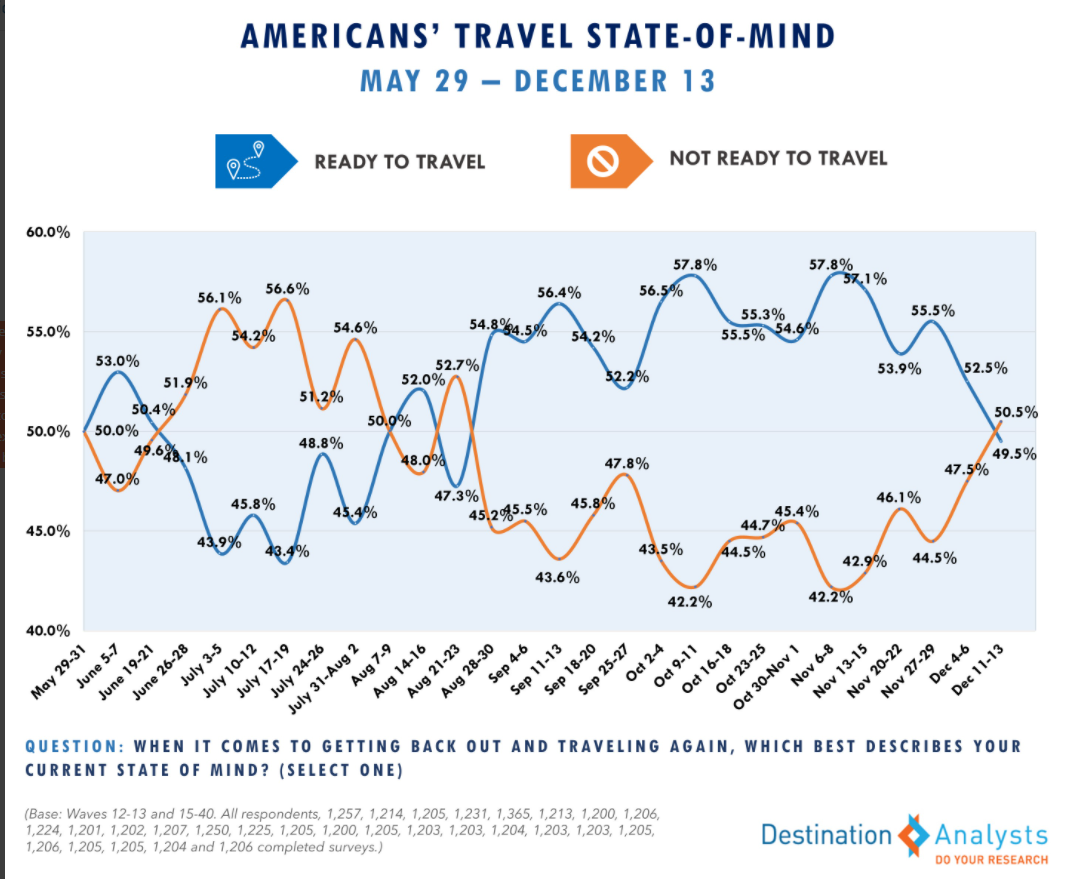
Americans did receive a good “dose” of positive news in the last week, however, which is appearing to have a profound effect on their outlook for 2021. Last week the first person outside of trials was vaccinated for COVID-19 and shipments for an FDA approved COVID-19 vaccine began rolling out of a Pfizer plant in Michigan over the weekend. With vaccines imminent, the percent of Americans who say they are not traveling without one leapt up to 49.5% from 40.8% just last week. The percent of Americans who feel the recently developed COVID-19 vaccines are safe jumped to 62.4% from 53.3% last week. Now a study high of 49.6% affirm they will take the recently developed vaccine–up more than 10 percentage points in 5-weeks. 45.2% of parents with children under age 18 say they will vaccinate their children for COVID-19, up from 37.9% last week. Importantly, 58.9% of Americans are back to feeling that the vaccine developments make them more optimistic about life returning to normal in the next six months, while 51.0% say the vaccines makes them more optimistic they can travel safely by then.
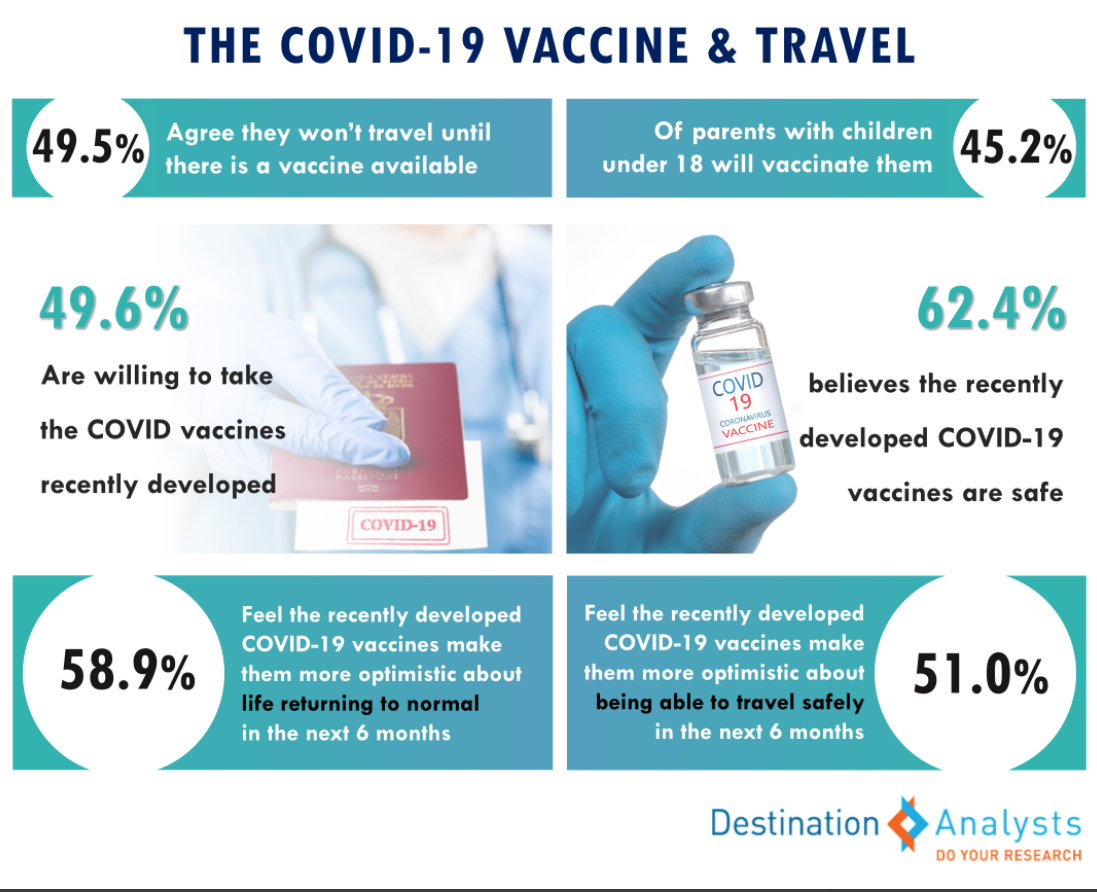
As Americans look at what the coronavirus has taken away from us, they also see areas of their lives which the pandemic situation has strengthened. The pandemic has, unsurprisingly, most weakened Americans sense of physical safety, as well as, sadly, their excitement about the future. However, an important percentage of Americans feels the pandemic has strengthened their feeling of being loved by others, and made them feel proud of themselves and what they have been able to accomplish. When asked what emotions are priorities for them, two of the top four are happiness and relaxation–things travel still is called to provide when they are comfortable.
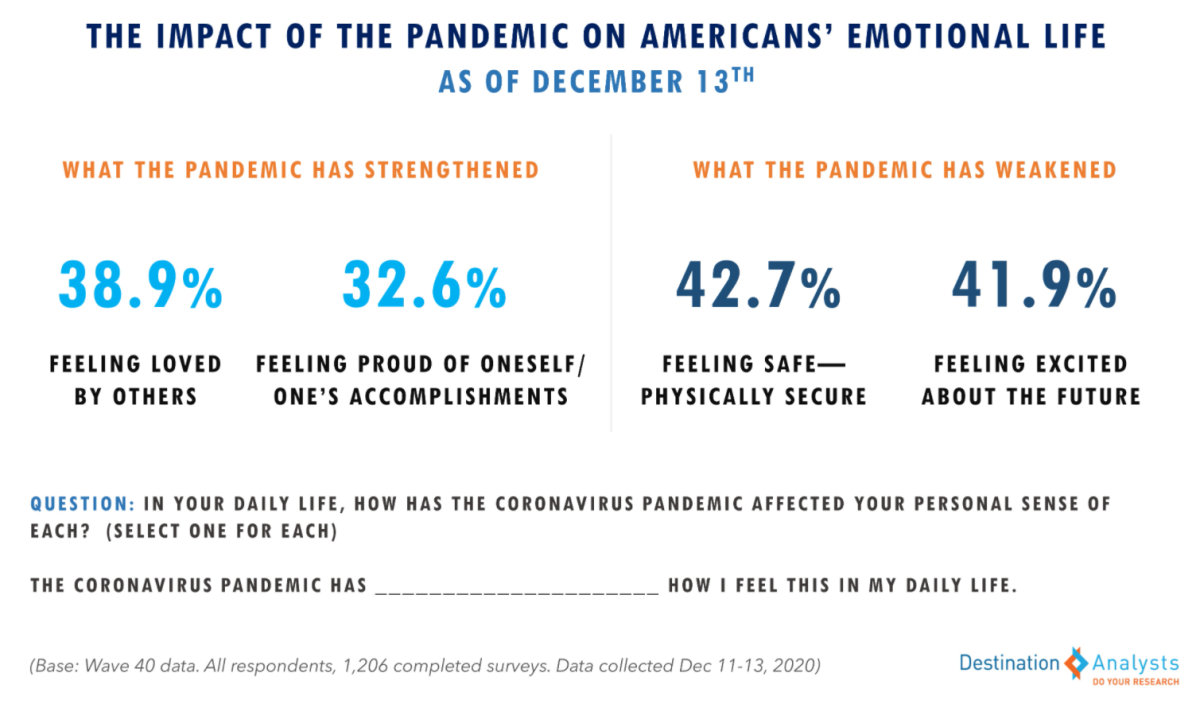
Americans continue to exhibit receptivity to travel marketing for future trips. 50.1% continued to show higher degrees of excitement about taking a getaway soon, a metric continuing to recover from a low point hit the week of November 16th. And 45.7% continue to have higher levels of openness to travel inspiration. In fact, the percent of Americans who recalls seeing a travel advertisement recently has risen steadily since May—up to 31.1% from 17.8%. When asked how the most recent travel ad they saw made them feel, 56.7% report this ad made them feel happy or very happy. Looking at the preferred channels for travel inspiration among those Americans most ready to travel, Facebook and Instagram, search engines and email campaigns is where these travelers will be most receptive.
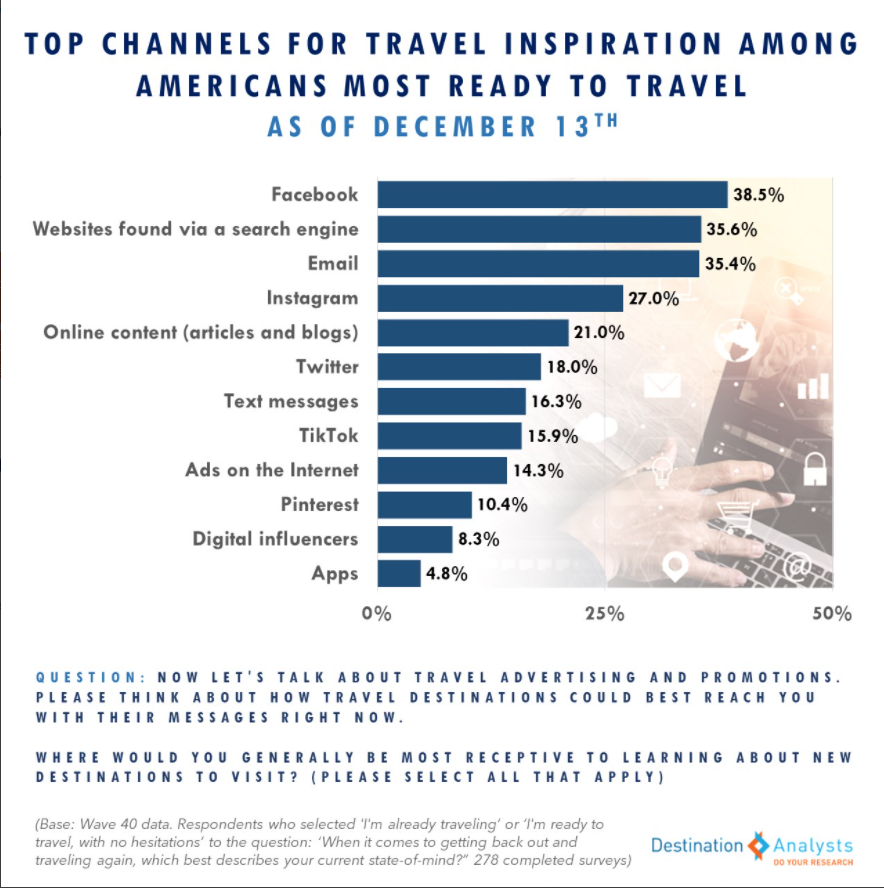
Looking at the recovery of the meetings industry, the percent of American travelers who have at least tentative plans to attend a convention or conference in the next year has risen to 23.5% from 15.7% two months ago. Just 26.3% said they would be happy if they were asked by their employer to attend a conference within the next six months, while 42.0% would be unhappy. You can see this sentiment when looking at comfort levels in attending such events in each of the next several months. As shown in the chart below, comfort grows in June 2021 and continues throughout the subsequent months. Right now 54.3% of American travelers say they at least somewhat trust other conference attendees to behave in a way that keeps others safe from COVID-19, while 60.7% say they trust the event producers to look out for their health.
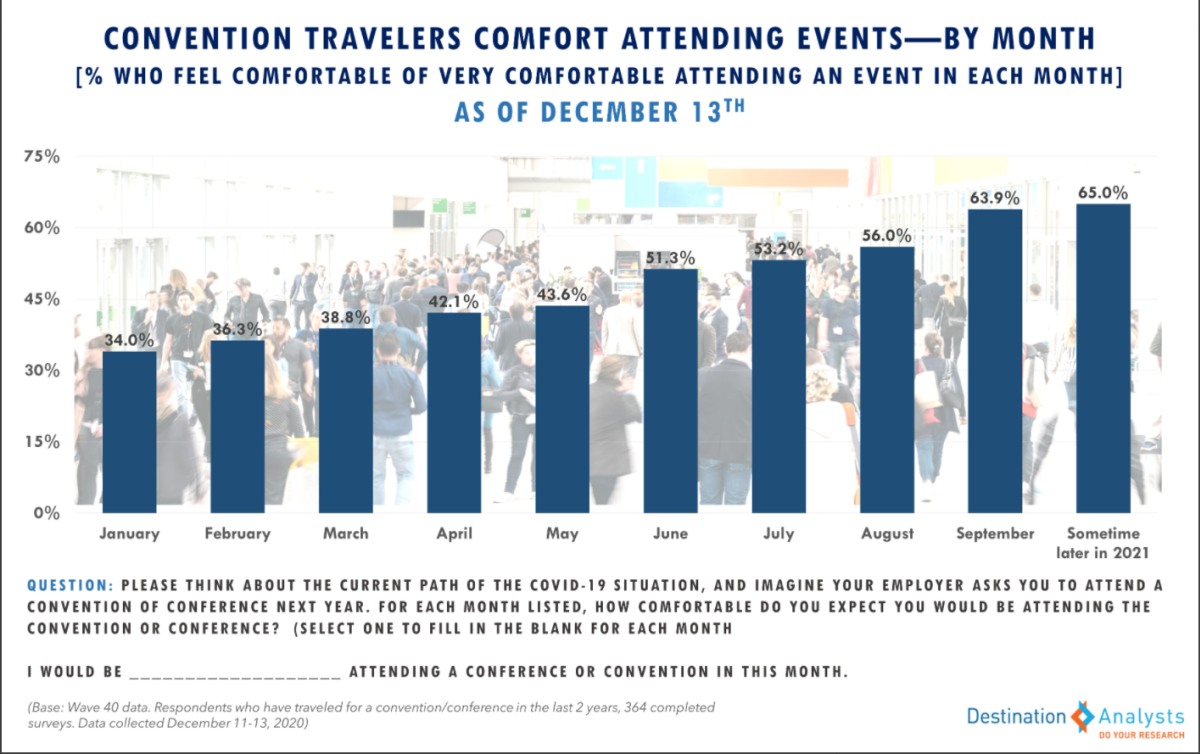
In our many recent interviews of meeting planners, it looks like hybrid events will be a norm in 2021. It is also important to track the level of threat virtual events pose to the recovery of the convention industry. Fortunately, among those who have traveled for conventions in the last two years, 51.7% say they prefer in-person events. Yet, greater than one in five of these travelers (22.0%) say they prefer hybrid meetings. However, the destination in which a meeting is held could still sway a preference for in-person. 56.7% of convention travelers say that where a convention is held would affect their preference for an in-person versus hybrid meeting.
